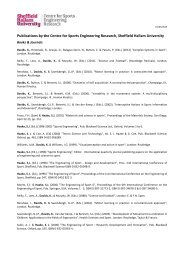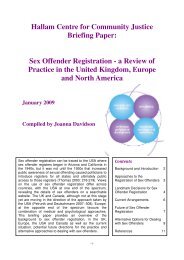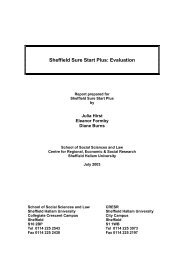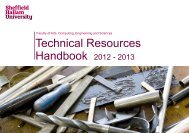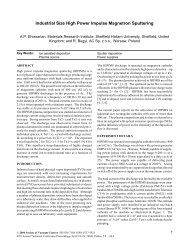The exercise of judicial discretion in rent arrears cases - Sheffield ...
The exercise of judicial discretion in rent arrears cases - Sheffield ...
The exercise of judicial discretion in rent arrears cases - Sheffield ...
Create successful ePaper yourself
Turn your PDF publications into a flip-book with our unique Google optimized e-Paper software.
Most <strong>of</strong> the district judges felt that they were ruled by the court adm<strong>in</strong>istrators on the<br />
question <strong>of</strong> list<strong>in</strong>g. Although <strong>in</strong> some courts there was evidence <strong>of</strong> discussions between<br />
judges and the court manager lead<strong>in</strong>g to changes <strong>in</strong> list<strong>in</strong>g practices, one judge was clear<br />
that there was limited room for manoeuvre:<br />
“Each court manager has to put <strong>in</strong> a return as to how efficient they have been…<strong>in</strong><br />
comply<strong>in</strong>g with this list<strong>in</strong>g requirement, so there’s no mercy. And it’s just a question<br />
<strong>of</strong> resources, quite honestly.” (DJ I)<br />
In the <strong>in</strong>terviews, judges were asked about the impact <strong>of</strong> the changes <strong>in</strong> the Civil Procedure<br />
Rules, and whether this had any effect on the outcomes <strong>of</strong> possession <strong>cases</strong>. One district<br />
judge summarised the cur<strong>rent</strong> procedure as “all very much a matter <strong>of</strong> the case be<strong>in</strong>g judgeled”<br />
(DJ B). However, these changes seemed to be less significant than the changes <strong>in</strong><br />
landlord practice which have led to most claimants not be<strong>in</strong>g legally represented. When<br />
neither party is legally represented, it becomes more important for the judge to pick up any<br />
po<strong>in</strong>ts <strong>of</strong> law and to ensure that all the requirements for possession have been met.<br />
Standardised record<strong>in</strong>g forms. It might be thought that pro forma records could provide<br />
an aid to consistency; however, we found that these forms were not standard for every<br />
county court. All the courts we visited had their own ‘tick box’ form used by district judges to<br />
record evidence and details <strong>of</strong> the hear<strong>in</strong>g and the order made, <strong>in</strong> each case. In London and<br />
Northern 1, these pro formas were identical. When completed, they provide a useful record<br />
<strong>of</strong> the hear<strong>in</strong>g: which parties attended; whether they were represented and by whom; any<br />
order made, and on what grounds. <strong>The</strong> forms also acted as a prompt to the district judge to<br />
obta<strong>in</strong> salient facts such as the date <strong>of</strong> the tenancy agreement, the date notice was served,<br />
the amount <strong>of</strong> the <strong>arrears</strong>, and the <strong>rent</strong> level, both gross and net (<strong>of</strong> hous<strong>in</strong>g benefit) before<br />
the mak<strong>in</strong>g <strong>of</strong> the order. In West Country court a variant was used, possibly an earlier<br />
version <strong>of</strong> the one already described. It <strong>in</strong>cluded fewer details for a suspended possession<br />
order, no details <strong>of</strong> possession orders made on mandatory grounds, and fewer facts: just the<br />
weekly <strong>rent</strong> and the amount <strong>of</strong> the <strong>arrears</strong>.<br />
<strong>The</strong> pro forma used <strong>in</strong> Northern 2 is very diffe<strong>rent</strong> from those used <strong>in</strong> the other three courts.<br />
As well as provid<strong>in</strong>g for a record <strong>of</strong> the parties and their representatives, the form allows the<br />
district judge to tick the sentence: “Defendant has been at court and agreed to order”. This<br />
<strong>of</strong> course records <strong>in</strong>formation given to the court by the claimant, rather than any evidence<br />
given by the defendant, imply<strong>in</strong>g that although the tenant had attended the court build<strong>in</strong>g,<br />
s/he had left before the actual hear<strong>in</strong>g follow<strong>in</strong>g a meet<strong>in</strong>g with the claimant landlord. <strong>The</strong>re<br />
is no tick box on the Northern 2 court pro forma for record<strong>in</strong>g details <strong>of</strong> the tenancy<br />
agreement or notice served, although there is space to note cur<strong>rent</strong> <strong>rent</strong> and whether this is<br />
30



